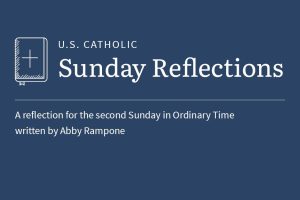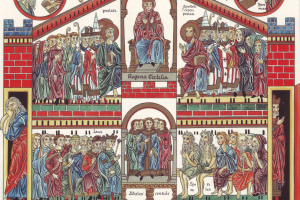Recently, a lifelong Catholic family member passionately insisted that although she “doesn’t like everything” about former President Trump—such as his role in the 2021 insurrection that attempted to violently overthrow our democratic process—she will vote for him without hesitation because he is “pro-life.” This brought to mind another conversation with a Catholic friend, who argued that although former President Trump sometimes uses racist rhetoric, she could not vote against him because the other candidate would fund Planned Parenthood and would “jeopardize family life and everything I hold dear,” presumably through supporting same-sex marriage.
Such conversations are not uncommon. The history of Catholic women voting in the United States is complex, but voting for so-called family values seems to be a through line.
When women originally procured the right to vote and make their voices heard in the political realm—over the objections of many male clergy—their initial foray into politics focused on causes that would assist women and their families, such as protections for working mothers. However, their efforts quickly morphed into a focus on Catholic moralism and family values, as they began to advocate for things like anti-birth control policies and legislation for modest dress. Indeed, as historian Jeanne Petit noted, women voters were admonished that “their freedom to operate as political actors had to be tempered by their submission to the Catholic hierarchy. Staking out a position that strayed from Church teachings … would not be possible.”
Despite rhetorical and theological insistence that women and men are equal in the eyes of the Creator, Catholic women generally have been excluded from dialogue and pressured to conform with male interpretations of the faith—Catholic women who dare to express diverse perspectives are silenced and accused of being un-Catholic. Given this perpetual backdrop, Catholic women have felt pressure to engage in public life in ways that protect traditional gender roles and ideologies, even as they have always been the backbone of communities and social welfare initiatives. Petit observes that, “Long before the phrase ‘family values’ entered the political lexicon, the women of the [National Council of Catholic Women] articulated a political identity for themselves as defenders of fixed gender roles in the family and traditional views of sexuality and opponents of any legislation or movements that fought for women’s autonomy.”
We see the focus on individualistic and moralistic concern—framed by “family values”— today, as well. Indeed, in 2020, nearly 70 percent of white Catholics in the United States who attend Mass regularly voted for an administration whose misogyny is evident, whose leader admitted to sexual assault and was convicted of rape in civil court, and which explicitly advocates for the imposition of authoritarian structures. If they promise to uphold the family values that maintain traditional norms—outlawing abortion and limiting LGBTQ+ rights, for example—then Catholics feel justified in giving a pass for implementing policies that directly and objectively harm families, such as separating migrant families, rolling back anti-racist housing reforms, doubling child poverty by letting the Child Tax Credit expansion die, or suppressing the votes of communities of color. (Importantly, Catholics often fail to realize that attending to such practical needs does more to reduce abortion, for example, than legal prohibitions. The two need not be separated.) Actual harms occurring in actual families appears to be of less concern than the assumed spiritual harm we are warned will “destroy the family” through violating traditional norms.
While a focus on the family might seem to promote dignity, it only serves to wall off the family from the broader community when pursued at the expense of social support initiatives. If my concern for the well-being of my own family—or “the family,” abstractly—leads me to ignore, suppress, or negate the concerns of other people and families, this is a false sense of “family values.” Our concern for families cannot be abstract—such abstractions absolutize our personal moral sensibilities and resist empathy; rather, family values must manifest in political life in ways that support the practical well-being of families. In other words, a focus on the spiritual purity of individual families without care for the well-being of neighbors is just another form of individualism. As Pope Francis puts it, “authentic and mature love and true friendship can only take root in hearts open to growth through relationships with others. As couples or friends, we find that our hearts expand as we step out of ourselves and embrace others. Closed groups and self-absorbed couples that define themselves in opposition to others tend to be expressions of selfishness and mere self-preservation.”
I recognize that the human person is both sacred and social, and this enjoins us to promote a sustainable social fabric that invites all to thrive. But this cannot be done through coercive political tactics that impose particular norms at the expense of practical need. Indeed, the inevitable political conclusion of individualism is authoritarianism, and it is worth noting that many feminists argue that authoritarianism is a form of patriarchal oppression, and that dictatorships, and institutionalized inequality, are rooted in inequality in the family.
Importantly, I stand on the shoulders of Catholic women throughout history who have called the church away from the hierarchical, patriarchal worldview that generates individualism and either/or thinking to a both/and paradigm of communal interconnection. We can point to many examples of women who integrate political activism and embodied community care: the work of Dorothy Day and the Catholic Worker Movement, Sister Mary Antona Ebo and other Black religious sisters who organized within and without the church to secure civil rights, and today’s NETWORK Lobby for Catholic Social Justice come readily to mind.
And today, we are in a historic moment for female leadership. From the presidential candidacy of Kamala Harris to the votes of Sister Nathalie Becquart and other women in the Synod, women are offering inspiring paths for seeking the common good. Harris is running a campaign that displays the strength of joy and compassion; Becquart hopes that her participation will encourage “a new style of leadership that is a servant and collaborative leadership.”
I am reminded of St. Pope John Paul II’s affirmation that “to serve means to reign,” and his ebullient praise of women, who he says model this Marian authority through motherhood. However, the church has historically been skeptical of the participation of women in leadership—venerating their servanthood even as the practical decision making is done through the power of (male) hierarchy. (It is telling that there is a movement in this election season to remind women that their vote is private and they can safely vote differently than their husbands.)
It is time for the church to reject all efforts to turn inward and subvert the common good to individual moral norms; it is time to distribute influence away from the patriarchal hierarchy, toward the servant-leaders the church claims to value. If the church is to fulfill its mission, it must listen to women, including those who challenge traditional interpretations of the faith
Image: Unsplash/David Todd McCarty













Add comment